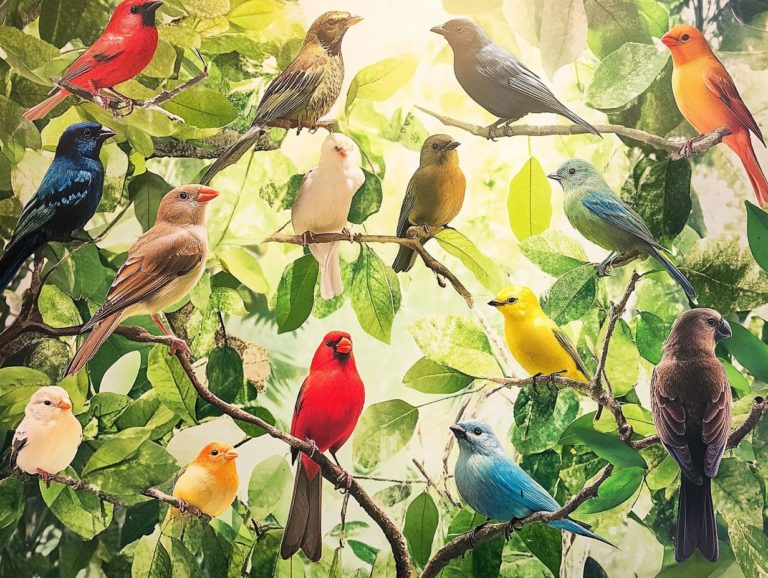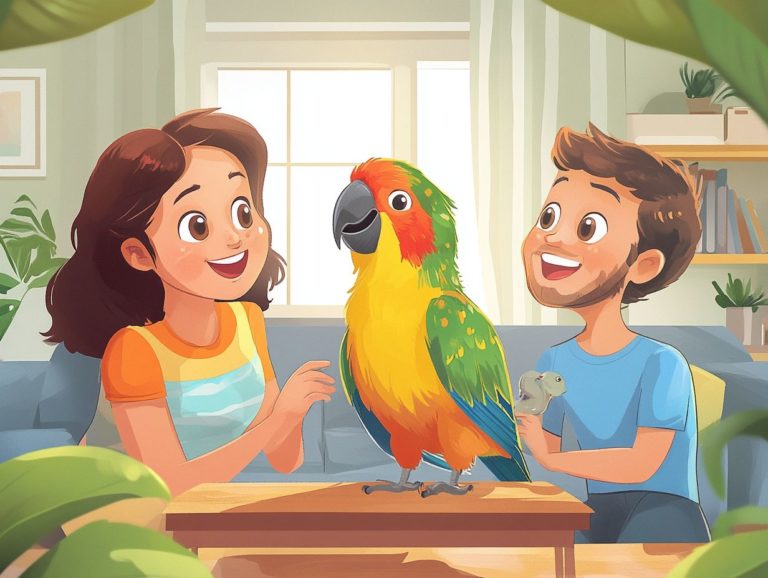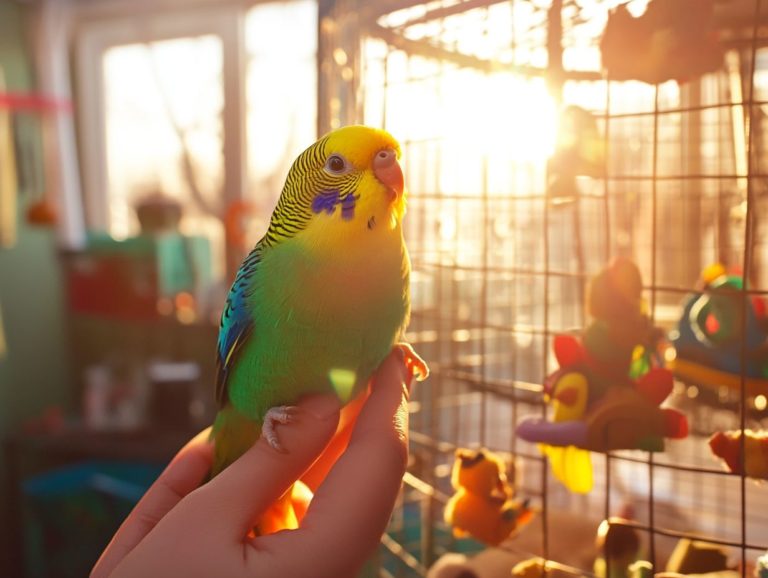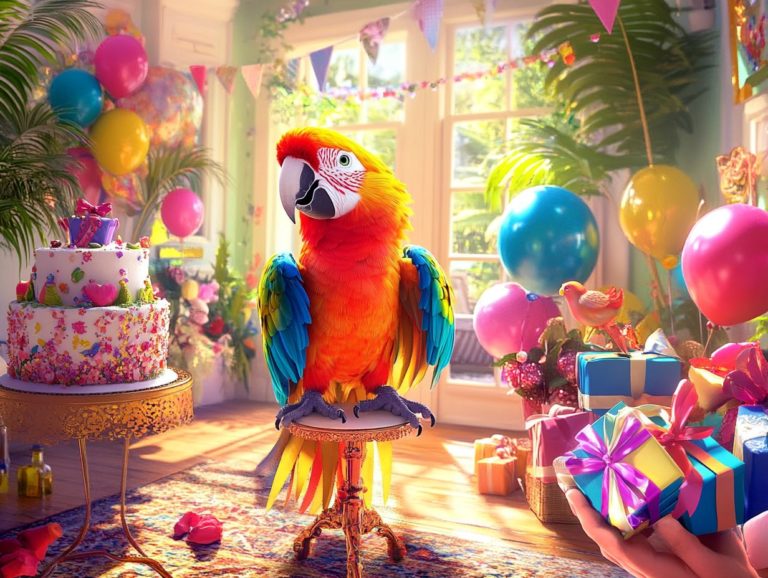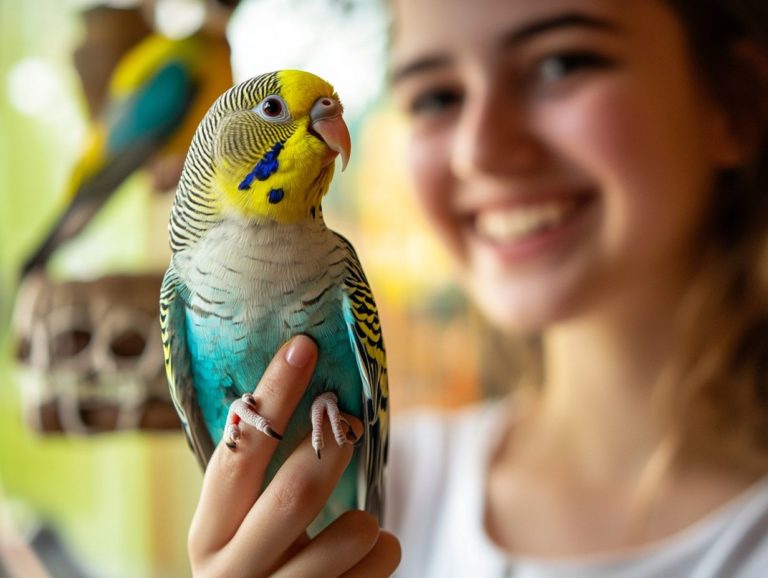5 Things to Consider When Adopting a Finch
Adopting a finch can be a delightful experience. However, it comes with special responsibilities.
Before inviting these charming birds into your home, consider some key factors. You need to understand their species, habitat, and nutritional needs.
This guide provides insights into finch care. You’ll feel empowered to make informed decisions for a happy, healthy pet.
Contents
- Key Takeaways:
- 1. Do Your Research on Finch Species
- 2. Prepare the Right Environment for Your Finch
- 3. Understand the Nutritional Needs of Finches
- 4. Be Aware of Potential Health Issues
- 5. Consider the Commitment of Owning a Finch and Their Lifespan
- What Are the Different Types of Finches and Their Characteristics?
- Frequently Asked Questions
Key Takeaways:
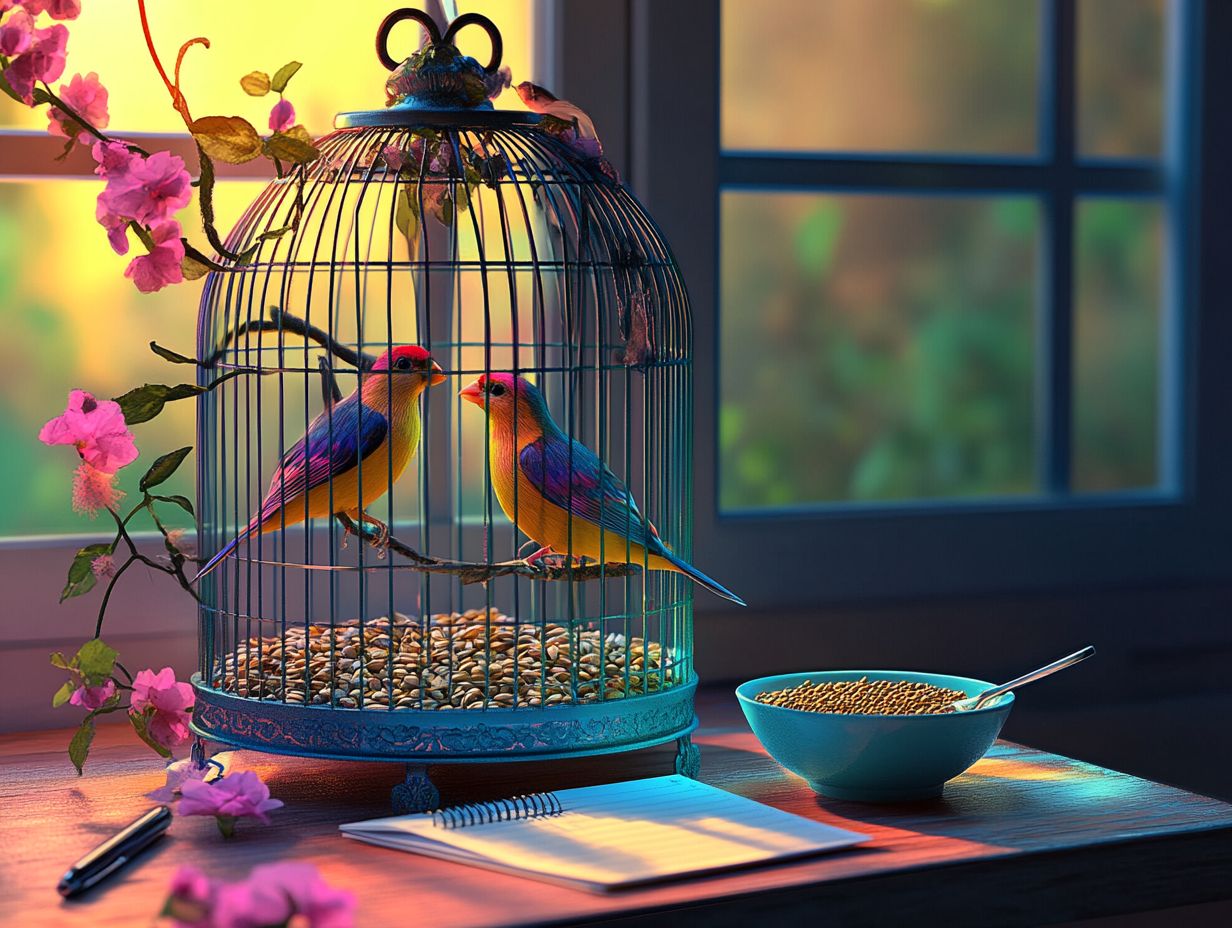
- Research different finch species to meet their specific needs.
- Create a suitable cage with proper setup, temperature, and lighting.
- Understand their diets and provide seeds, fruits, and vegetables.
1. Do Your Research on Finch Species
Before bringing a finch home, research the different finch species. To ensure a smooth transition, consider learning ways to make your adopted bird feel at home. Each species has unique traits and needs that affect your experience.
Understanding breeds, like the vibrant Gouldian finch, enhances your journey. Choose a species that fits your lifestyle and preferences.
For example, lively Zebra finches are great for beginners because they are sociable and easy to care for. In contrast, the more sensitive Society finches thrive in larger social settings.
Some finch species are very vocal, while others are quieter. Knowing these differences helps you find the right fit for your home.
With these insights, you can create a harmonious living environment for your finches.
Taking the time to consider these factors leads to a rewarding experience for you and your finch.
2. Prepare the Right Environment for Your Finch
Your finch needs a safe and stimulating habitat to thrive. Creating the right environment is essential for their happiness and health.
A good cage should measure at least 30 inches long, 18 inches wide, and 18 inches high. This size provides space for flying and hopping.
Place perches at different heights to encourage natural movement. Multiple food and water containers help prevent territorial disputes.
Add a variety of toys like swings and mirrors to enrich their environment. This promotes health and strengthens your bond with your feathered friend.
3. Understand the Nutritional Needs of Finches
Understanding what finches need to eat is essential for their growth, energy, and long-term health. Their diet plays a pivotal role in their overall well-being.
A balanced finch diet should consist of high-quality finch pellets, a variety of seeds like millet, and occasional treats such as fresh fruits or hard-boiled eggs to meet their dietary requirements.
By ensuring these needs are met, you can prevent health issues like calcium deficiency and promote a vibrant, active life for your pet finches.
To achieve this, it s crucial to incorporate a range of foods, ensuring each meal is rich in vitamins, minerals, and healthy fats. Introducing new foods gradually is key; starting with small amounts of fruits or vegetables can encourage your finches to explore different tastes without causing distress.
Always provide fresh water, as hydration is vital for their overall health. Keeping an eye on their droppings can help you spot signs of nutritional deficiencies, such as changes in color or consistency, indicating a need for dietary adjustments.
By monitoring their eating habits and being proactive about their diet, you can help your feathered companions truly thrive.
4. Be Aware of Potential Health Issues
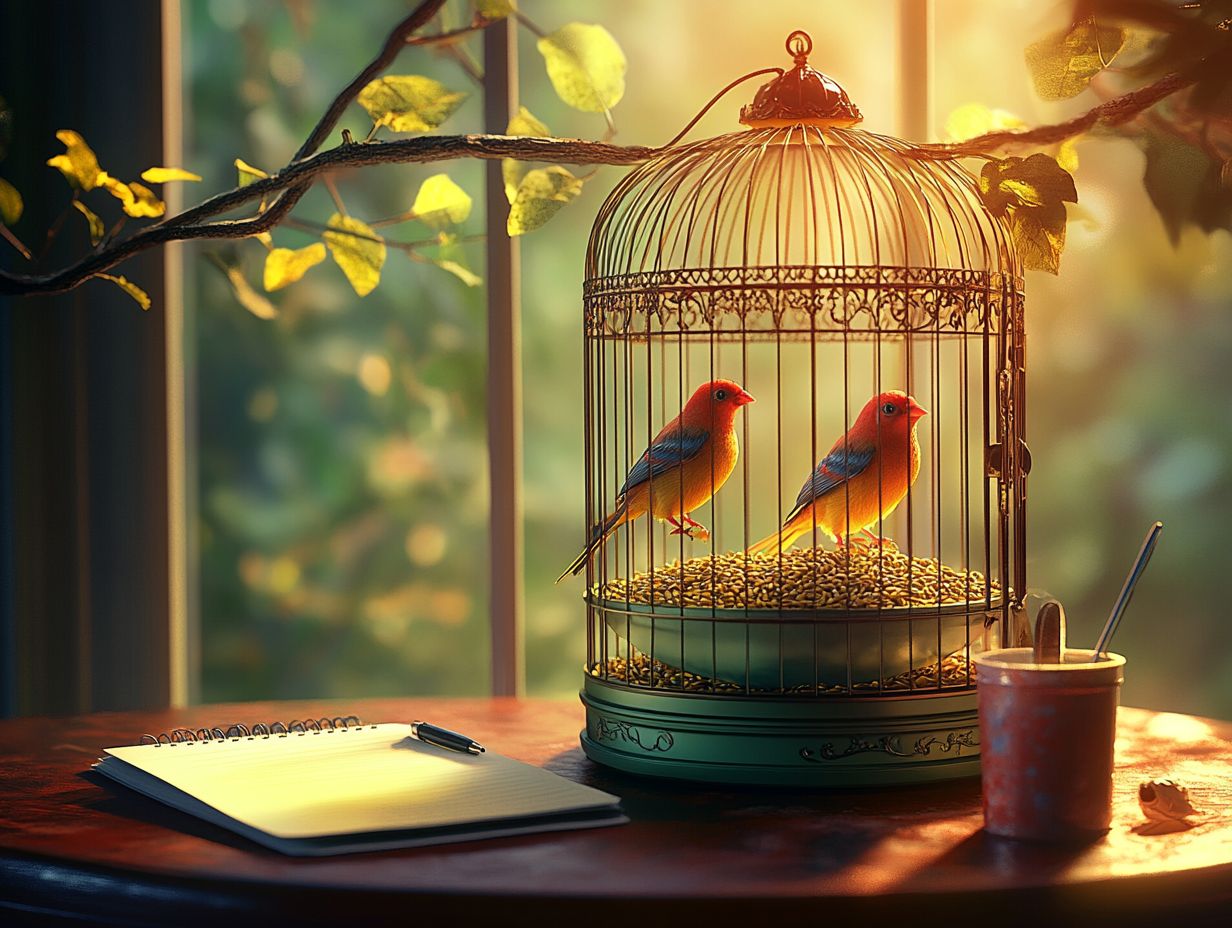
Stay alert! Knowing potential health issues can keep your finches thriving. Common ailments like Aspergillosis, Bumblefoot (a common foot condition that can cause pain), and egg binding can greatly affect their well-being, making timely intervention essential.
By understanding the signs of illness like shifts in behavior or physical symptoms you enable yourself to seek appropriate treatment from a qualified finch vet, ultimately enhancing the health and happiness of these delightful companions.
Familiarizing yourself with key preventive measures can significantly reduce the risk of health issues. Maintain a clean and safe environment, provide a balanced diet, and ensure they receive ample social interaction.
Regular vet check-ups are vital, allowing for the early detection of any abnormalities in your finch s condition. Stay vigilant for symptoms like lethargy, fluffed feathers, or changes in appetite, and don t hesitate to consult your veterinarian if something seems off.
Implementing good home care practices, such as proper cage hygiene and selecting nutritious foods, will contribute immensely to sustaining their vibrant health.
5. Consider the Commitment of Owning a Finch and Their Lifespan
Owning a finch is a rewarding yet significant commitment that demands a deep understanding of their care and management to ensure a fulfilling companionship. As a finch owner, you must recognize the daily responsibilities involved in maintaining your feathered friends.
This includes providing proper nutrition, ensuring a clean environment, and engaging with them regularly to nurture their social behaviors and habits.
Embracing these commitments not only enhances the well-being of your finches but also fosters a lasting bond that enriches both your life and theirs.
It’s important to understand that finch ownership is a long-term commitment; these small birds can live for several years when properly cared for.
This dedication involves daily feeding routines, regular cage cleaning, and creating a stimulating environment that encourages social interaction and play.
To prepare adequately, you might consider establishing a daily schedule that incorporates feeding, cleaning, and socialization time. Researching different finch breeds is also beneficial, as each may come with unique personality traits and care needs.
By planning ahead and dedicating time to understand these charming creatures, you can ensure a harmonious and enriching life for both you and your finch companions.
What Are the Different Types of Finches and Their Characteristics?
Finches are a captivating group of birds with a variety of species, each showcasing distinct characteristics that appeal to pet owners. From the dazzling colors of Gouldian finches to the friendly nature of Society finches, every breed offers unique colors, behaviors, and social needs that influence their suitability as companions.
Understanding the traits of various finch species helps you make an informed decision when selecting the perfect finch. For a comprehensive overview, check out our health check for finches. This ensures your new feathered friend integrates seamlessly into your home and lifestyle.
Take the zebra finch, for example. It’s known for its melodious songs and adaptability, making it a delightful addition to many households. In contrast, the Cut-throat finch requires specialized care due to its unique dietary requirements and sometimes temperamental nature. Color variations also play a significant role in your choice, as many pet owners are naturally attracted to the striking plumages.
Consider how social dynamics affect finch behavior. Some species thrive in pairs or small flocks, fostering companionship and reducing stress. Others prefer solitude. If you’re considering adding a pet bird to your home, it’s also essential to learn about caring for your first cockatiel. Matching a finch’s personality traits and social needs with your preferences leads to a joyful and enriching experience, creating a fulfilling pet-owner relationship.
How Should You Set Up a Finch Cage?
Setting up the perfect finch cage is essential for keeping your pet finches comfortable, healthy, and happy. A spacious cage allows them to thrive. Choose a cage that is large enough for flight and exercise and include key accessories like perches and toys to encourage their natural behaviors.
Different finch species, such as zebra finches and society finches, have unique space requirements. Aim for a cage length of at least 30 inches, with taller cages providing more vertical space for climbing. Position perches at varying heights and angles to invite exploration. Include multiple food containers and toys to create a playful environment.
Regular cleaning is crucial. A hygienic habitat prevents illness and keeps your finches active. A clean cage greatly enhances their quality of life, making it enjoyable for both the birds and you as their caregiver.
What Should You Feed Your Finch?
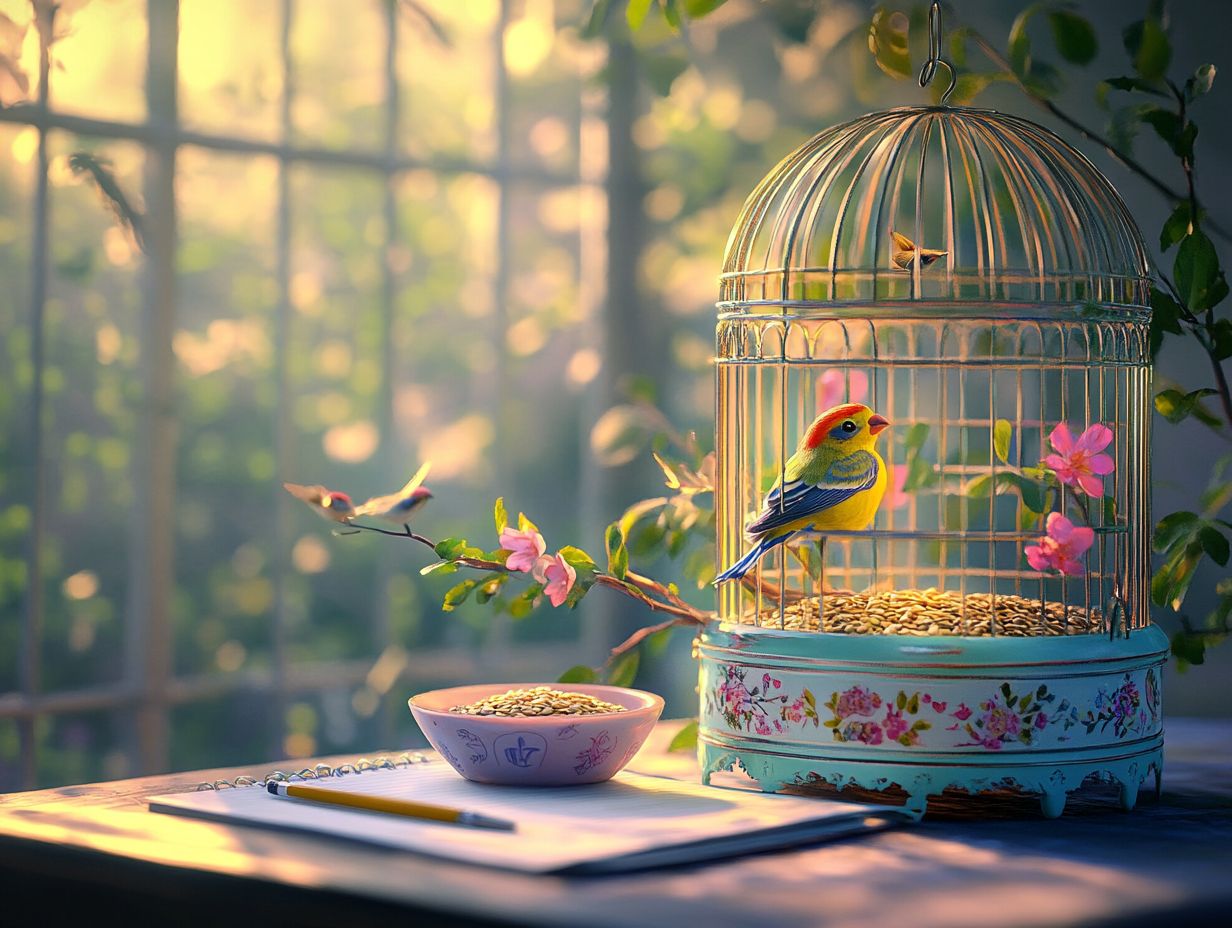
Feeding your finch a well-balanced diet is essential for their health and happiness. This requires a thoughtful approach to their dietary needs.
Incorporate a variety of foods to ensure they receive all necessary nutrients. High-quality finch pellets and seeds like millet are essential. Leafy greens such as kale and dandelion greens will help your finch thrive. Occasionally offering berries and apples adds hydration and fiber, adding a delightful twist to their menu.
When introducing new foods, do so gradually. This allows your finch to adjust to new tastes without overwhelming them. Always provide fresh, clean water, as hydration is crucial for their well-being. Regularly cleaning food and water containers is vital to prevent bacterial growth, ensuring your finch remains healthy and happy.
What Are the Most Common Health Issues in Finches?
Understanding the most common health issues in finches enables you to recognize symptoms early. This helps you seek timely treatment for your cherished pets. Conditions like Aspergillosis, Bumblefoot, and eye inflammation can seriously affect their well-being. It s essential to learn about these ailments and their signs.
Regular vet check-ups and knowing about finch illnesses help with effective treatment. This enhances the quality of life for your feathered companions.
You might notice signs such as lethargy, changes in appetite, or difficulty in movement. These could indicate underlying health issues. Emphasizing the importance of regular vet visits allows these symptoms to be evaluated promptly. Early intervention could save a finch’s life.
Keep their space clean, give them a balanced diet, and watch how they interact. These actions can significantly reduce health risks. By staying vigilant and proactive, you can contribute positively to your finches’ long-term health and happiness.
What Is the Lifespan of a Finch?
The lifespan of a finch can vary significantly based on species, care, and environmental factors. With proper care, many pet finches thrive for 5 to 10 years. Understanding what can extend your finch’s life is crucial! Factors like diet, habitat, and social interactions play a role in providing optimal care.
Regular attention to their health and well-being fosters a fulfilling companionship that lasts for years. Different species, such as the Zebra Finch or Society Finch, have unique needs that can affect their lifespan.
It s vital to offer high-quality nutrition, including a balanced diet rich in seeds, fruits, and greens. Creating a spacious and stimulating environment filled with plenty of toys and perches encourages physical activity.
Providing opportunities for social interaction whether with other finches or through gentle handling nurtures a sense of security and happiness. When you invest time in understanding these aspects, you’ll improve the quality of life for your finches and extend your cherished companionship.
What Are the Basic Care Requirements for Finches?
Caring for finches means immersing yourself in their fundamental care needs. This enhances their health, happiness, and overall well-being as cherished companions.
Creating the perfect environment for these petite birds requires your attentive and informed approach. For instance, their habitat should feature:
- Ample perches for resting and play
- Engaging toys to stimulate their minds
- Proper ventilation while safeguarding against potential hazards
A well-rounded diet is essential, incorporating high-quality seeds along with fresh fruits and veggies to meet their nutritional needs. Social interaction plays a pivotal role in their happiness. Finches truly flourish in the company of their own kind, so consider keeping multiple birds together.
Regular health monitoring is crucial; even subtle shifts in behavior can signal health concerns. By understanding finch behavior everything from their social dynamics to their unique vocalizations you ll be better equipped to respond to their needs, fostering a more enriching environment for them.
Daily maintenance routines, like cleaning their cage and ensuring they have fresh water, will significantly contribute to a joyful and healthy life for your finches.
Frequently Asked Questions
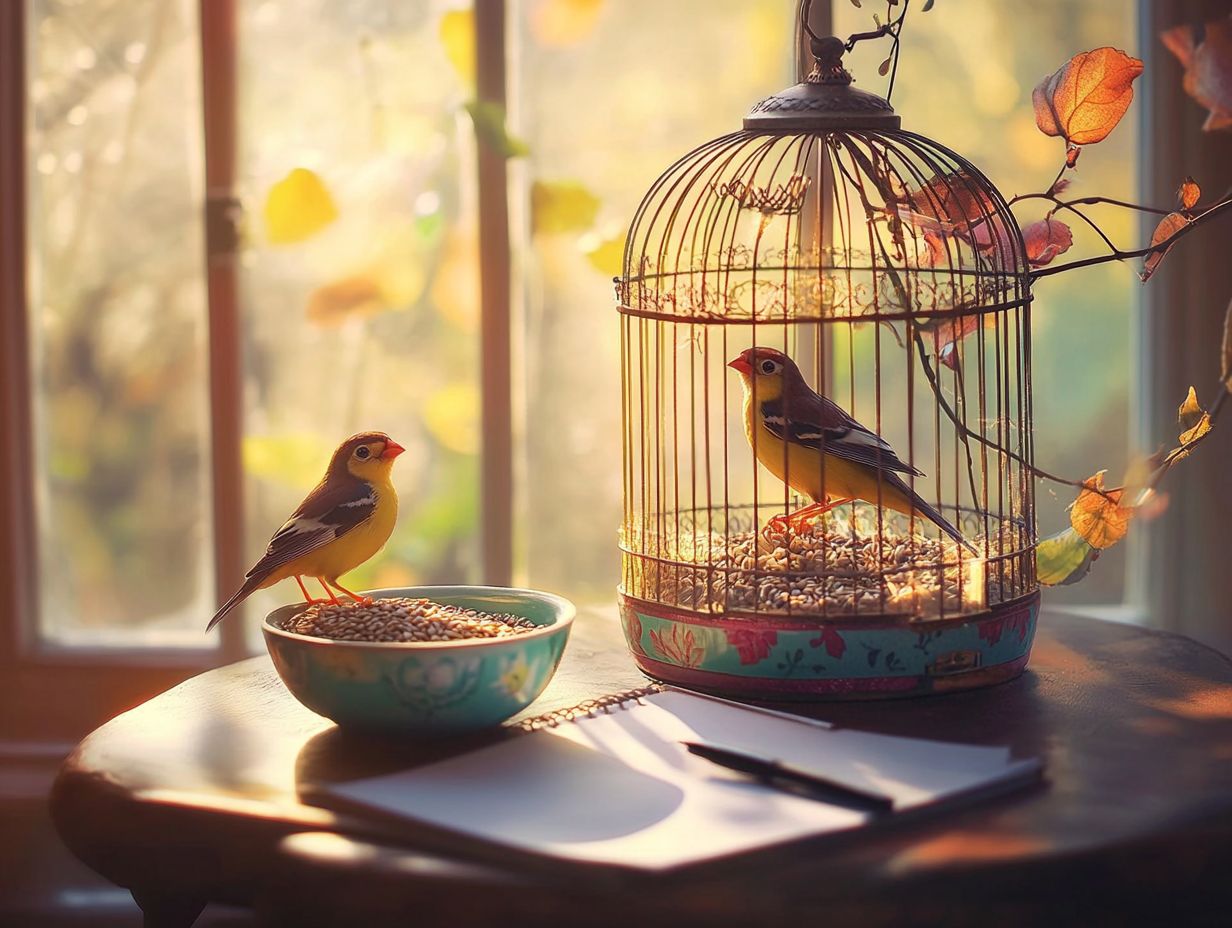
What are the top 5 things to consider when adopting a finch?
The top 5 things to consider when adopting a finch are its diet, cage size, social needs, potential health concerns, and lifespan. Additionally, it’s important to learn about transitioning your bird post-adoption to ensure a smooth adjustment.
What should I feed my finch?
Finches require a diet that includes a variety of seeds, pellets, and fresh fruits and vegetables. It is important to research the specific dietary needs of your finch species.
How big should my finch’s cage be?
The cage should be large enough for your finch to fly and exercise comfortably. It should also have enough room for perches, toys, and food and water dishes.
Have questions or tips about finch care? Feel free to comment below!
Do finches need companions?
Finches are social birds. Ideally, they should be adopted in pairs or small groups. They thrive on the company of their own kind and feel happier with friends.
What are common health concerns for finches?
Common health issues for finches include respiratory infections, mites, and lack of proper food. Keep a close eye on your finch s health. Seek veterinary care when needed!
How long do finches typically live?
Finches usually live for about 5 to 10 years. With proper care and a good environment, you can help them live longer!

